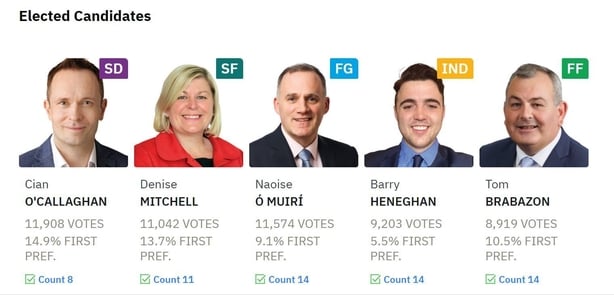How it started ...

With 20 candidates and five seats, the Dublin Bay North count was a really long slog - until it wasn't.
It was always going to be an interesting constituency after two incumbents - Fine Gael's Richard Bruton and Fianna Fáil's Seán Haughey - retired from politics.
A third, Labour's Aodhán Ó Ríordáin, was elected an MEP for Dublin in June's European elections.
Two other incumbents, Social Democrats Deputy Leader Cian O'Callaghan and Sinn Féin's Denise Mitchell, contested the race - and were elected on the eighth and 11th counts, respectively.
But that meant that the five-seater constituency, which also had some reasonably significant boundary changes, was always going to elect at least three new TDs.
And that it did: Fine Gael's Naoise Ó Muirí, a former Dublin City Lord Mayor, was elected after his third attempt at Dáil Éireann.
Fianna Fáil's Tom Brabazon, also a former Lord Mayor, was elected on his first attempt.
And 26-year-old Barry Heneghan, whose first foray into politics was the local elections earlier this year, was also elected on his first run at the Dáil.
The Clontarf councillor, and now TD, told RTÉ News that people wanted an "independent young voice to represent them in Dáil Eireann".
Mr Ó Muirí, who exceeded the quota after receiving more than 4,400 transfers from running mate Aoibhinn Tormey, Mr Heneghan and Mr Brabazon were all elected on the 14th and final count - just before 1am this morning.
Mr Heneghan and Mr Brabazon were elected without reaching the quota.
It's Mr Heneghan's election that was most surprising.
Though he had the backing of constituency stalwarts Finian McGrath, the former Independent TD, and Damien O'Farrell, the former Independent councillor, it looked like he had an outside chance based on first preferences.
He even told RTÉ News that he was not particularly hopeful of getting elected.
The fifth seat instead looked like it would be a battle between Fianna Fáil's Deirdre Heney and Fine Gael's Aoibhinn Tormey.
But it became clear after the 10th and 11th counts that Mr Heneghan was especially transfer friendly.
He picked up significant chunks of transfers from all sides of the spectrum, from Aontú to Labour.
After the 13th count, he was in third place. He ended up taking the fourth seat comfortably.
There will be some disappointment for Sinn Féin, however - their candidate Denise Mitchell not only topped the poll here in 2020, but got the highest number of first preferences nationally.
If their support in the constituency had held up at those levels, then their tight vote management this time out may have gotten Ms Mitchell's running mate, Micheál Mac Donncha, over the line. But he ultimately ended up finishing eighth in the pack.
Despite a strong showing nationally, Labour will also be disappointed.
Their candidate, Shane Folan, who also failed to get elected in the local elections earlier this year, did not retain Mr Ó Ríordáin's seat on his first attempt at election for the Dáil.
How it ended ...







